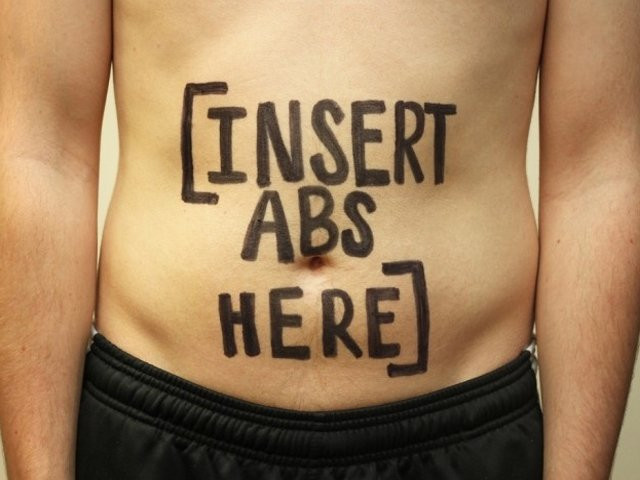“Drop 10 pounds of fat now!”
“Three ways to naturally boost your testosterone.”
“Get huge arms and a chiseled six-pack fast!”
Something like that, I’m sure. What I do remember is that the cover model’s arms looked as wide as my head, and his abs may as well have been sculpted by Thor’s hammer.
https://www.instagram.com/p/Bi1taHcBjFE/?utm_source=ig_embed
“Look at his arms,” I pointed out to my brother. “They’re huge!”
“Mine are pretty good too,” he joked back, pulling up his sleeve and puffing in his chest, as he flexed.
He’s 10 years younger and the complete opposite of me, both in personality and physicality. At 14-years-old, he’s in prime puberty. He’s skinny, but you can already see the vascularity in his arms. He does, in fact, have discernible abs.
My body is not like that. I’ve never seen my abs – a nice cushion of belly fat has always kept them well-hidden. I’ve done my best to make sure nobody noticed. Over time, I became very good at sucking my stomach in.
I cross my arms and stand up straight to look tall and defiant. I tuck my hands behind my biceps rather than resting them on top to make them look bigger – in case anyone is looking. Nobody is.
Men are insecure, too
I’ve been slowly coming to terms with my own body image issues, but it’s a strange environment. Women have long faced intense scrutiny for how they look and what both eastern and western standards deem ideal. Perhaps the most infamous example in the South Asian community is the propagation of the ‘Fair and Lovely’ skin lightening cream, a product that unabashedly markets lighter-skinned women as more attractive.
We’ve begun taking steps to fight these toxic ideals, from the viral #UnfairAndLovely hashtag that celebrated South Asian women of all body types and skin colours, to celebrities such as Vidya Balan championing body positivity. Albeit we have miles to go to undo the psychological rewiring of women’s self-perceptions, while simultaneously building a foundation of self-love early on – but it’s a hopeful start.
For men, on the other hand, body image has largely been a non-issue – publicly, anyway – such that the rising prevalence of male insecurities has gone unnoticed. The lack of conversation around this has left many men exactly how you’d expect: alone and insecure.
A 2012 survey of 394 men found that about 80% of men talked about their weight, hairline, frame, and other physical factors negatively. Like myself, 63% of these men felt they weren’t muscular enough. And about 30% actively thought about their aesthetics at least five times a day.
Feeling self-conscious about our weight is a universal insecurity. But men tend to worry more about being underweight and desire a hypermuscular physique. This, coupled with a negative body image, is a psychological disorder called muscle dysmorphia. Those affected may engage in extreme behaviour to achieve their desired look, such as over-exercising, hack diets, or excessive use of supplements, and even steroid abuse.
But the problem goes beyond the desire to look muscular. Men, too, suffer from eating disorders. According to a report by National Eating Disorders Association, 25% of men are affected by anorexia and bulimia. In all cases, research suggests body image issues usually start early in adolescence, and are linked to higher rates of depression, anxiety, and suicidality.
Media’s historical impact on body image
Toxic masculinity has defined the “ideal man” to be more than just muscular. Other physical attributes, such as balding or receding hairlines, penis size, and height are also common anxieties. All three are genetically determined, but it’s often promulgated that men with a full head of hair, a large or above average penis and a tall stature are more desirable than those without. While there are surgical or chemical ways to enhance these qualities, they don’t solve the underlying insecurities of a man’s personal sense of masculinity.
Unsurprisingly, the media plays a very large, if not the most significant role in this.
Modern Hollywood movies adapt these looks as well. Consider how many celebrity body transformations you’ve seen in which someone packs on muscle mass while shedding significant body fat in an impossibly short amount of time? Chris Evans, Hugh Jackman, Chris Hemsworth, and Alexander Skarsgard come to mind.
https://www.instagram.com/p/BKvBJTMjF9F/?utm_source=ig_embed
Hitting the gym… for the wrong reasons
Do I wish I had bigger arms or wider shoulders? Yes.
Do I mindfully note a lack of those qualities when I see myself shirtless in the mirror? Yes.
Do I worry about my physical appearance when I wear short-sleeved shirts? Most definitely.
In fact, for most of my college career, I actively didn’t wear short sleeves, even in the summer months, because I thought the size of my arms compared to the size of my belly made me look disproportionate, and therefore unattractive.
Last year, I decided to invest in a personal trainer at my gym. After injuring my knee trying to work out on my own, I decided training with a professional would help mitigate risk of injury in the future. But if I’m being honest, my initial motivation to join a gym was for that “desirable aesthetic”.
My trainer, Tom Van Langen, has been training clients for almost four-and-a-half years. He estimates that a vast majority of his male clients joined the gym only to look better, not to actually learn proper diet and exercise. These motivations are more common and apparent in younger clients, he says. Langen also notes that these superficial motivators often fall short of keeping clients committed to their routine, so they often plateau with their progress. His older clients, on the other hand, are commonly driven by a desire to become stronger and healthier, so they can keep up with the kids and grandkids. They, Langen points out, are more likely to stay on track at the gym, too.
“People naturally tend to compare themselves to others around them,” Langen says. “The gym is where the smaller insecurities come out.”
So, how do we combat them?
Detoxifying body image talk and more
Education plays a big role. When it comes to gaining or losing weight, it’s important to differentiate between gaining muscle and losing body fat, and how diet and exercise both have an impact. It’s also vital to find the intrinsic motivation for why you choose to diet and exercise. Wanting to look better isn’t a superficial motivator. But if you’re not doing it for yourself, it can be.
Secondly, it’s key to understand that bodies portrayed in the media (both male and female) are often enhanced and airbrushed to look larger than life. In a nutshell, they’re not real.
We can use our social media platforms to break down stereotypes promoted by toxic masculinity and femininity and uplift individuals who do not fit into the thin, light-skinned body types valued by Hollywood and recent Bollywood media. Most importantly, we can create environments (online, in a classroom, in a one-on-one dialogue, etc) where individuals, including men who may not feel comfortable being vulnerable in front of others, can speak about their insecurities freely and without fear of judgment.
Looking forward
As for me, I didn’t initially want to admit that I was (and still am) insecure about my own physicality so publicly. The irony of that is not lost on me. I still see those Men’s Health magazines every time I’m at the grocery store checkout. Part of me still wishes my body looked exactly like those of the models emblazoned on the covers.
But choosing to learn more about toxic masculinity and the psychological effects it has on men has taught me at least one thing: I am not alone.
Over time, I’ve learned to slowly tune out those harmful images and just focus on myself. And hopefully one day, I’ll truly be able to grow into my own skin.
This post originally appeared here.



COMMENTS
Comments are moderated and generally will be posted if they are on-topic and not abusive.
For more information, please see our Comments FAQ